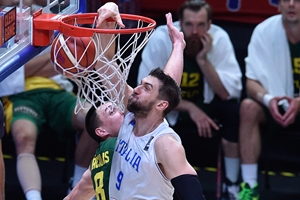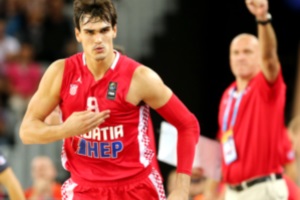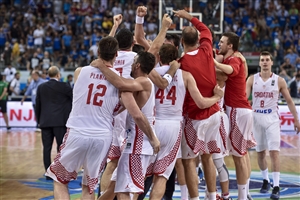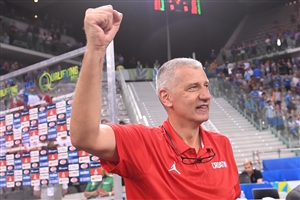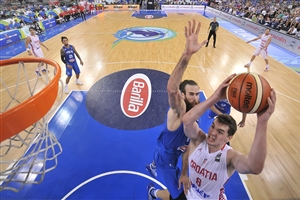
Iran rely on Bauermann's steady hand
TEHRAN (2016 FIBA Olympic Qualifying Tournaments) - There are no bold predictions coming out of Iranian basketball these days.
National team coach Dirk Bauermann has been involved in the international game long enough to know that success is never guaranteed. Winning does not happen by chance, but through hard work, and plenty will be needed for Iran to maintain its status as a leading country in the Asian game and a regular participant in major tournaments like FIBA Basketball World Cups.
Iran have had a very good run. The countless hours of practice on the hardwood began paying off in 2007 when the national team reached the top of the podium at the FIBA Asia Championship to qualify for the Olympics for the first time. Iran won the Asian Championship title again in 2009 and qualified for the following year's FIBA Basketball World Cup in Turkey. The country's third Asian Championship title came in 2013, which allowed it to play at the 2014 FIBA Basketball World Cup.

Mahdi Kamrani (IRI) played against Spain in 2014
What about the now for Iran, and the future? The successes of the past owed greatly to the performances of Hamed Haddadi, Samad Nikkhah Bahrami and Mahdi Kamrani. These three players have been linchpins in the national team.
These three top players of the last 10 years, Haddadi, Bahrami and Kamrani, they're incredible talents. - Bauermann
The trio has been the three-pronged weapon on both ends of the floor for Iran. No one could dispute that as recently as the 2014 FIBA Basketball World Cup on the biggest stage of all, or at last year's FIBA Asia Championship in Changsha-Hunan.
But what happens in life is the aging process and basketball players are not exempt. The Haddadi that played in 2007 and averaged 13.4 points and 9.6 rebounds? He was 22 years old. The Hadadi that played last year in China? He was 30.
Samad and Kamrani were 24 and 25, respectively, in 2007, and are now 32 and 33. Each of the three has the advantage of being more experienced yet the clock is ticking. Eventually, Iran will get the bulk of its points, rebounds, assists, steals and blocked shots from someone else.
"Just like it's impossible for Germany to replace (Dirk) Nowitzki, it's impossible to replace any of those three players," said Bauermann to FIBA.com. He coached Nowitzki from EuroBasket 2005 through the 2008 Olympics and again at EuroBasket 2011. "But, there is a young and coming generation that is highly talented - not as talented maybe as these three (Haddadi, Bahrami and Kamrani), but very talented, eager to learn, hard working. But it's going to take some time."
We have to be patient. Sooner or later, the three older players are going to stop playing for the national team and if we then start rebuilding with younger players, it's going to take some time. We will have to be patient once we decide to take that step. - Bauermann
The German coach, who had all three players in the squad at last year's Asian Championship and got a third-place finish, is now preparing for the time when Iran will no longer have its three greats. He is hands-on, travelling the country to work at clinics and with young players. Bauermann is trying to identify players with promise, and share his expertise with coaches.
Youth tournaments will be important for Iran. The experience gained at every level is essential for continued success.

Iran (IRI) had a team at the 2015 FIBA U19 World Championship
There is talent all over the country and we have to do a good job of finding talented players that have the right attitude and are good character people. And then we have to educate the coaches so they can do a better job of working with these players. - Bauermann
"I'm also heavily involved in our under-16 and under-18 national teams to help both the coaches and the players," Bauermann said, "a lot of work on the fundamentals, the basics of the game, the simple reads and all of these things. That's something that we need to get better at and we're in the process of doing."
There have been plenty of examples for Iran to watch in recent times that illustrate what is most important when it comes to having winning teams. Of course there has to be talent, but also the correct mindset. The idea that the collective is more important than the individual? That is essential for any team.
When Venezuela won the FIBA Americas Championship last year, they had virtual unknowns in their team, at least outside of their own country. There were no NBA players in their squad. Venezuela won in Mexico City after a tough and gruelling preparation and because of the players' belief that as a unit, they could clear any obstacle. The players trusted their coach, Nestor 'Che' Garcia, and executed the game-plan to perfection.
Iran will have talent once their famous trio has gone, but what will be more important is the attitude. The players will need to trust in each other and their coach.
"Sometimes, being extremely together as a unit, playing together at both ends of the floor, a cohesive unit, can most definitely make up for a lack of talent," Bauermann said. "At the end of the day, basketball is a team game and if you understand that, you show a collective will to win and you do a great job of functioning as a unit at both ends of the floor, anything is possible.
"Just look at German handball. Without any of their stars, because they were hurt, they won the (European Championship) gold medal there in Poland a couple of weeks ago. What Venezuela did, that's the blueprint of what we want to do once the older guys are retired. Even without those three, at one point, we're going to be a hard team to beat."
Bauermann will coach Iran at the six-team FIBA Olympic Qualifying Tournament in Turin 4-9 July. They will play in Group A against Greece and Mexico. If Iran were to finish in the top two, the national team would then face Italy, Croatia or Tunisia in a Semi-Final. The winners of the Semi-Finals will then square off with a spot in the Olympics at stake.
"We understand that our OQT is extremely, extremely strong," Bauermann said. "We have three top European teams with Italy as hosts, Croatia and in our group, Greece. Mexico is extremely strong as well. But anything is possible.
If you get off to a good start, maybe steal a game against Greece, which we know is going to be very hard, who knows? Even if that doesn't happen, beat Mexico and get to that second stage. Obviously the others, the Italians, are the big favorites to qualify but you just never know. - Bauermann
FIBA
